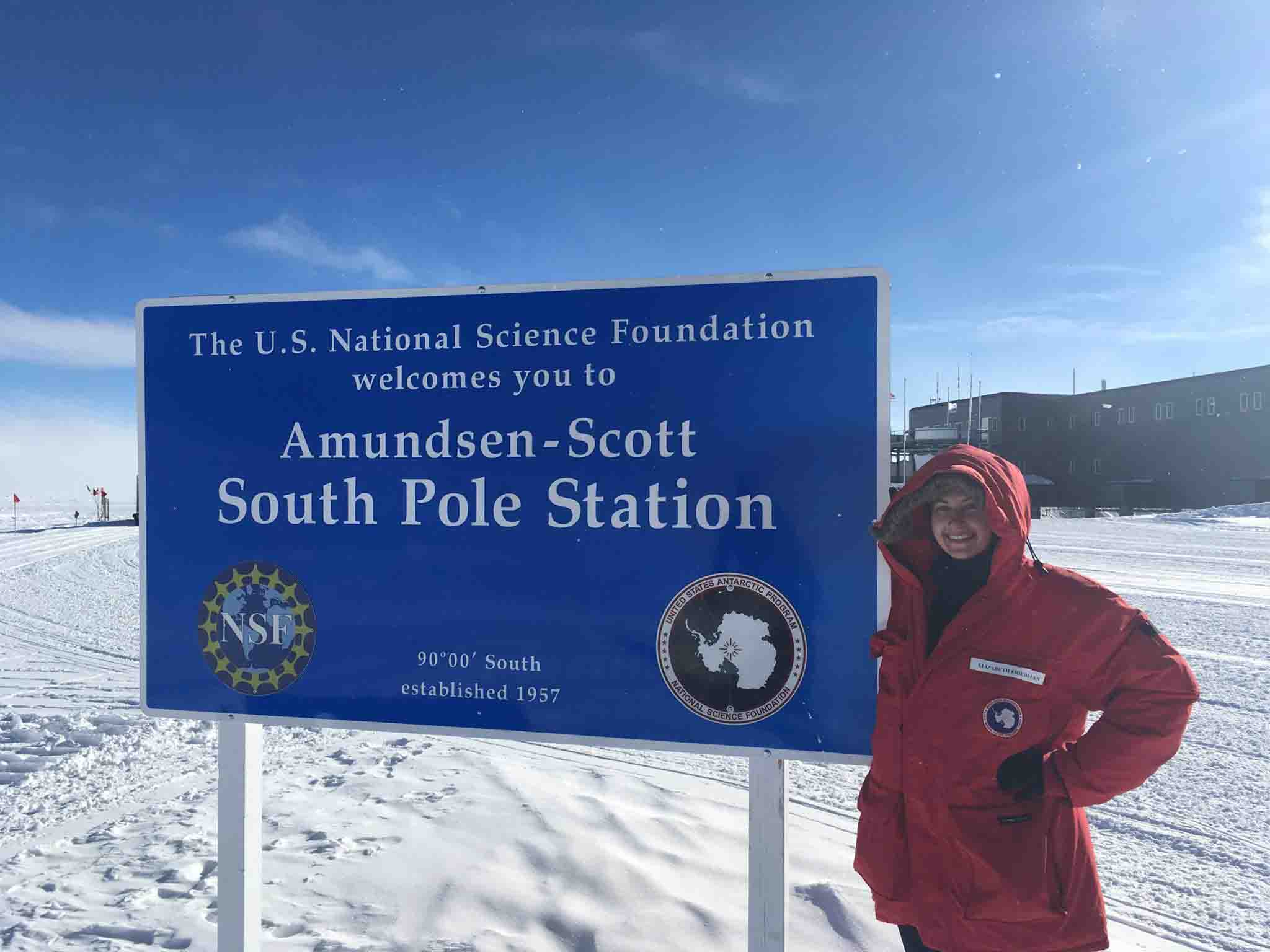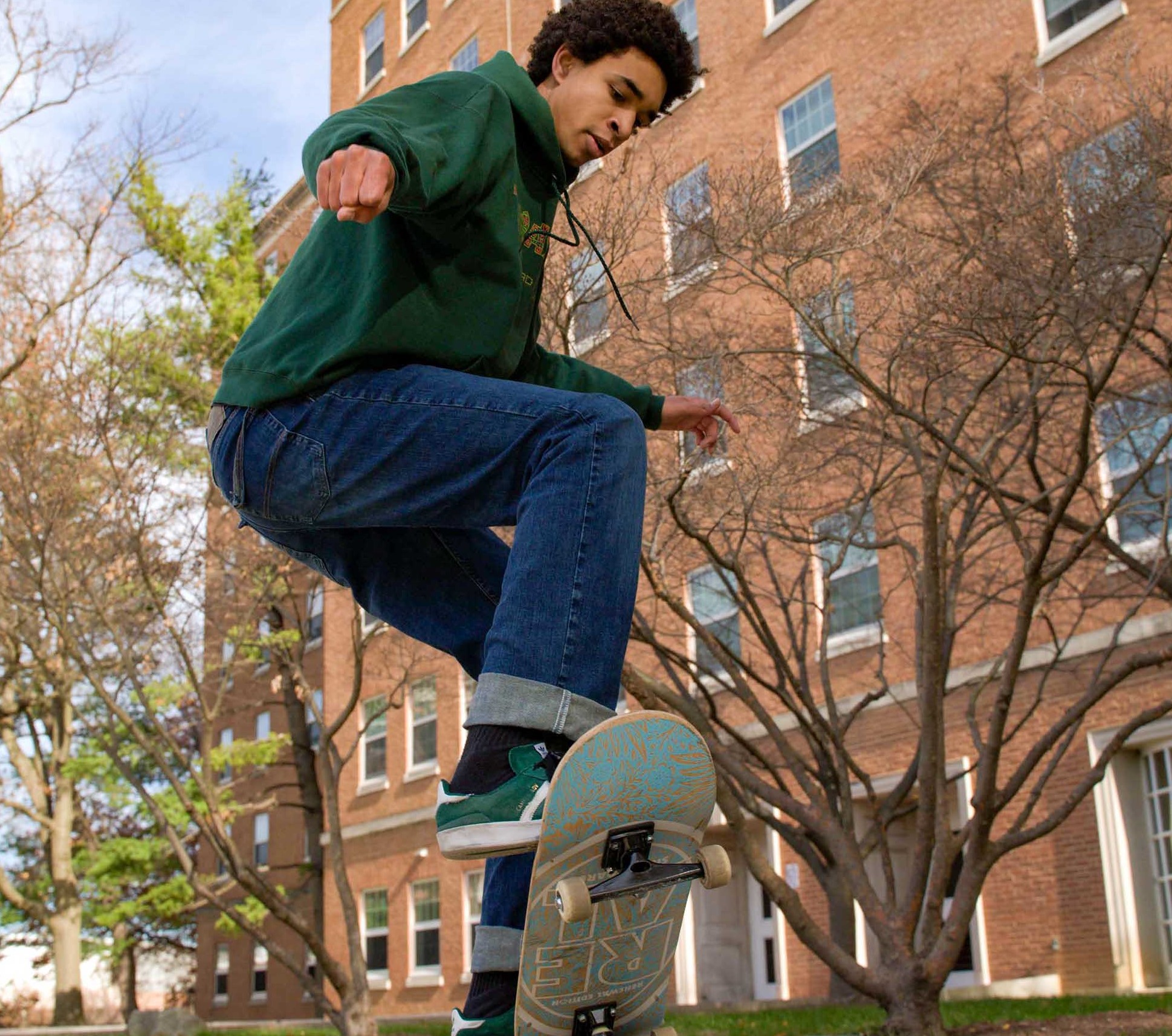Virtual Physics Undergraduate Research Showcase
![]()

Since arriving at the University of Maryland in 2015, physics Ph.D. student Liz Friedman has immersed herself in much of what the University of Maryland has to offer.
“It is important to remember that graduate school is a marathon and not a sprint,” Friedman said.
Friedman has been an active member of the Graduate Student Government, served as the treasurer of the Women in Physics group, conducted research in Antarctica, ran a few Tough Mudder obstacle courses, received multiple fellowships, and got married.
“The balancing act boils down to my research group encouraging a healthy work-life balance,” said Friedman, who is a member of Professor Kara Hoffman’s research group. “I am very lucky to have supportive advisors, and I was very careful to join a group where graduate students are happy and take time off from work.”
Before arriving at Maryland, Friedman earned her bachelor’s degree in physics from UCLA and then worked as a science teacher at a small private nonprofit school in Los Angeles for a year before beginning her graduate studies.
"When I was in eighth grade, I learned about neutron stars and got really excited about astrophysics," she said. "It was very rewarding to teach my favorite subject to my own class of eighth graders."
Friedman had the freedom to develop the curriculum, which was a dream come true for her.
"I got to do all the fun things like teach them about atoms and chemistry for the first time,” Friedman said. “They were so excited because these topics were brand new for many of them. Have you ever done flame tests with teenagers? It is amazing."
Her time as a teacher helped prepare Friedman for graduate school.
“I ask myself, ‘How would I explain this to someone else if I had to teach it?’ And that usually helps me organize what I know and what I don't know,” Friedman said. “If I can't thoroughly explain it, then there's something I'm missing.”
Friedman conducts her dissertation research at the IceCube Neutrino Observatory, which is the first neutrino detector to measure neutrinos beyond our solar system. It was designed to observe the cosmos from deep within the South pole ice. Friedman traveled to the observatory in Antarctica twice for one month to deploy crucial hardware for detecting neutrinos, which she helped to debug and test.
When she wasn’t working on IceCube, Friedman enjoyed spending time with her fellow South pole residents and even volunteered to be a wine steward for Christmas dinner on station.
"The most surprising thing is how much fun stuff there was to do,” she said. “Everybody hangs out, and it is a really nice social place. I miss it."
Embracing the community around her is something Friedman prides herself on. She has been able to make a difference on the campus level as a physics representative for the Graduate Student Government.
“The Graduate Student Government is big enough that you feel like you're making an impact,” she said. “It keeps you engaged with the campus and with what's going on.”
Back in the department, as a member of the graduate committee, Friedman helped improve the physics graduate student lounge; plan monthly potlucks for physics graduate students; and run the mentoring program, which included matching current graduate students with incoming first-year students.
“Being a part of graduate committee is one of the things I'm really proud of,” Friedman said. “I like getting people engaged in the community.”
Written by Chelsea Torres
Listen to Liz Friedman and Professor Kara Hoffman discuss the IceCube observatory at the South Pole:
Part 1 Part 2.

For the past four years, John Martyn could be seen whipping across campus on his skateboard. As he traveled from class to the lab on his board, Martyn was mastering the ultimate balancing act.
While the recent physics graduate wasn’t doing any calculations while he was on his skateboard, he knew physics was still at play.
“Certain ways that the board can flip are limited by physical principles,” said Martyn, who graduated in December 2019 with his bachelor’s degree in physics and a University Honors citation. “One theorem tells you that a certain way for a skateboard to rotate is actually unstable, so doing a trick that way is very difficult.”
Martyn started skateboarding 10 years ago, after he and his brother joined a neighbor they saw doing tricks outside. A past president of the UMD Skateboarding Club, Martyn appreciates that skateboarding has a way of rewarding riders for their hard work and effort.
“A lot of times when you're trying to learn a trick or do something that you haven't done before, it can take upwards of an hour. So when you finally land it and all of your friends celebrate, it’s a really good feeling,” Martyn said.
In the Skateboarding Club, members recorded videos of each other performing tricks and shared them on Instagram. They’ve also hosted skating competitions known as Games of S.K.A.T.E. and premiered a skateboarding film they made called “EXTRACURRICULAR.”
Outside of the skate park, Martyn spent his days studying physics equations in class and in the research lab. He recently published a first-author paper in the journal Physical Review A with UMD Physics Assistant Professor Brian Swingle.
Martyn joined Swingle’s group in 2017 to study quantum information and condensed matter. There, Martyn developed a method to prepare approximate thermal states on a quantum computer that may one day enable researchers to study novel condensed matter systems and models of black holes. In addition to the published paper, Martyn presented this work at the 2019 American Physical Society March Meeting and the 2019 National Collegiate Research Conference.
“John really strives for perfection in his work and has already demonstrated many of the skills needed to function as an independent researcher,” Swingle said.
Martyn spent the summer of 2018 with the Laser Interferometer Gravitational-Wave Observatory (LIGO) team at the California Institute of Technology, where he investigated quantum noise in LIGO’s gravitational wave detectors. He constructed optical components and other electronics for a prototype detector with improved sensitivity. For this work, Martyn received the 2018 Carl Albert Rouse Undergraduate Research Fellowship from the National Society of Black Physicists.
Other awards Martyn has received include a 2019 Goldwater Scholarship, the 2018 Angelo Bardasis Scholarship from the UMD Department of Physics and the 2016 Mary-Kathryn Abernathy Memorial Scholarship from the Community Foundation of Howard County.
With his degree in hand, Martyn will spend the spring interning at Google X, working on quantum computation research. He will return to campus in April to continue working on his research with Swingle’s group. He is also applying to graduate programs, with plans to pursue a Ph.D. in theoretical physics with a focus on quantum information and condensed matter physics.
“I want to do research once I’m out of school, ideally at a university and relating to physics,” Martyn said. “Being at Maryland has really helped me sharpen my interests and figure out my trajectory.”
Written by Chelsea Torres. Photo by Rakha Wibisana.